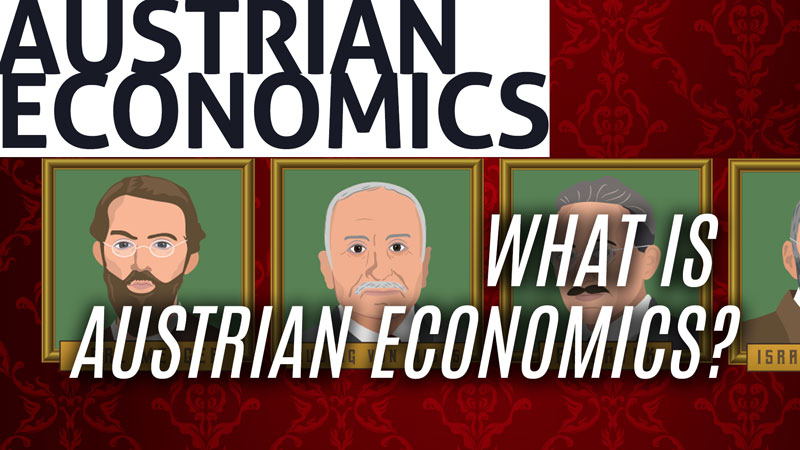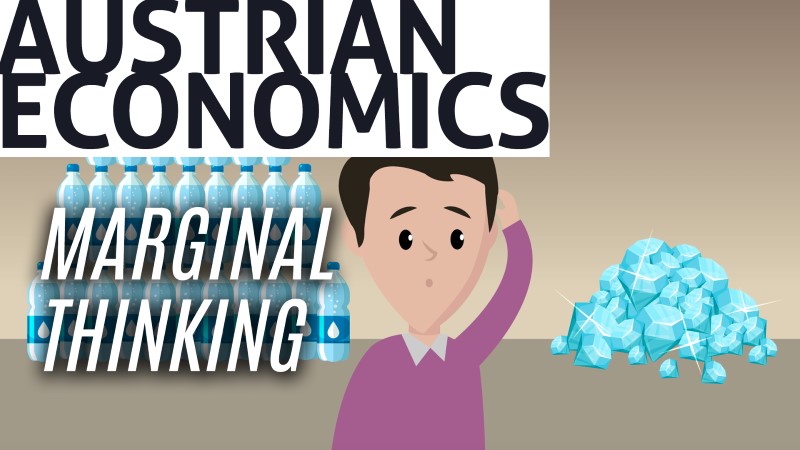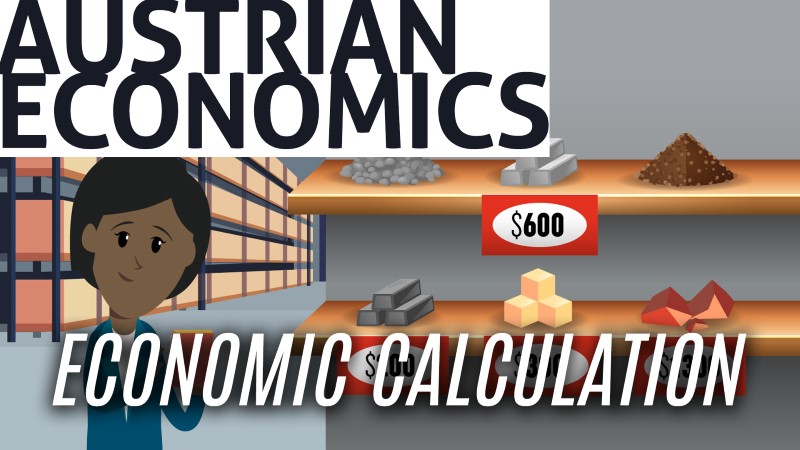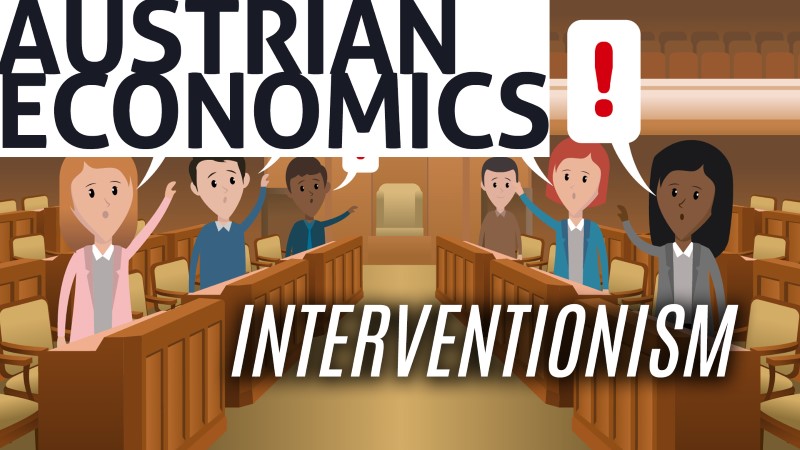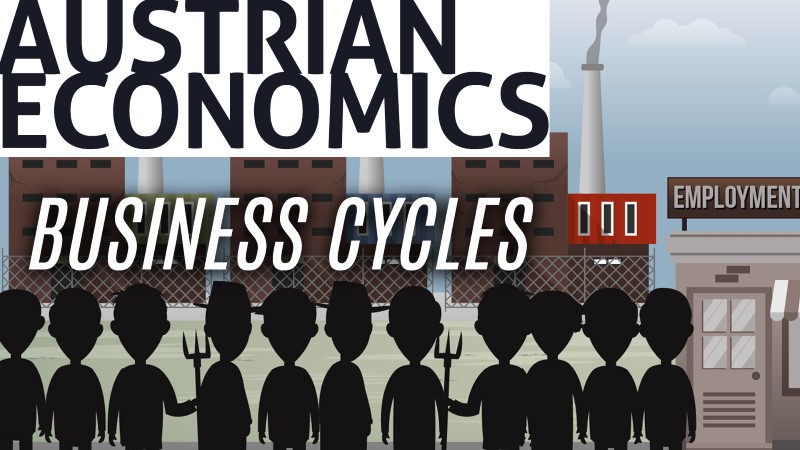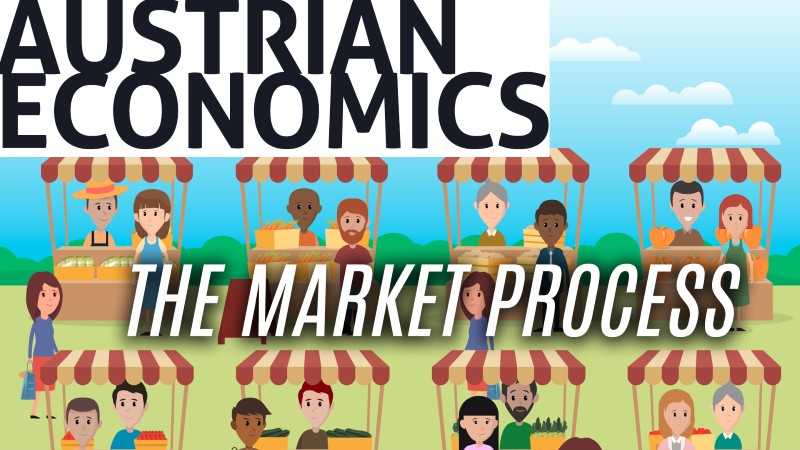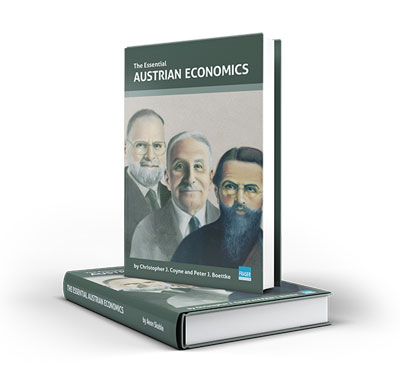by Christopher J. Coyne and Peter J. Boettke
The origin of the Austrian School of economics is the publication of Carl Menger’s Principles of Economics in 1871. Menger, William Stanley Jevons, and Léon Walras are considered the co-founders of the “marginal revolution” in economics, a shift to the marginal utility theory of value from the labour theory of value. The revolutionists argued that value is not based on the amount of labour expended but reflects how useful people perceive the commodity to be in satisfying their ends.
This revolution had radical implications for the way economists understood the world: consumer valuations, and not the amount of effort, is what determines prices. But what determines consumer valuations? This question had long perplexed social scientists. Why do consumers value diamonds, a luxury item, more than water, an essential for life? By introducing the concept of marginal utility, Menger and his co-revolutionaries were able to resolve this paradox.
The labour theory of value, however, was not Menger’s only target in his Principles. He was also engaging the German Historical School, which held that economic science is incapable of producing universal principles. In contrast, Menger, using marginal utility analysis as a foundation, argued that universal economic laws do apply across time and geographic space. Those in the German Historical School took issue with the claims by Menger and his colleagues about the possibility of universal theory and labeled them the “Austrian School” because they taught at the University of Vienna.
Subsequent generations of scholars have developed the insights of the Austrian School. The purpose of this book is to present an overview of the key tenets of Austrian economics by synthesizing the insights from these thinkers in a set of eight topics that capture the core elements of Austrian economics.
Listen In
Listen to the Essential Scholars Explained podcast with host Rosemarie Fike in conversation with the author to discuss the key tenets of the Austrian school of economics.

Austrians Economics Part 1: The Little Things that Keep the World Turning
Christopher J. Coyne, Professor of Economics at George Mason University and co-author of The Essential Austrian Economics, joins host Rosemarie Fike to discuss the contributions to economic thinking and systems made by the Austrian School, including how our quality of life is in large part thanks to countless interactions occurring within the market that allow everyday people access to the things we need to sustain us.
Austrian Economics Part 2: Government Intervention and the Assumption of Power
Christopher J. Coyne, Professor of Economics at George Mason University and co-author of The Essential Austrian Economics, returns to the podcast to join host Rosemarie Fike in a discussion about why the Austrian School’s way of thinking about politics, social change, and governmental power is as relevant today as ever—specifically, how advocating for expansion of state power may be intended as a vehicle for good but when leadership changes, so do the government’s priorities.
Download the Book
Get a digital copy of the book. Choose the version you prefer below.
Explore the Book
Chapter by chapter summary of the book.
-

Chapter 1
The History of Austrian Economics and Marginal Thinking
The origin of the Austrian School of economics is the publication of Carl Menger’s Principles of Economics in 1871. Menger, based in Austria, along with William Stanley Jevons in England, and Léon Walras in Switzerland, are considered the co-founders of the “marginal revolution” in economics. The marginal revolution was a paradigm shift from the established labour theory of value to the marginal utility theory of value. The labour theory of value held that the value of a commodity is a function of the labour required to produce the item. The marginal revolutionists, in contrast, argued that value is not based on the amount of labour expended, but rather reflects how useful people perceive the commodity to be in satisfying their ends.
-

Chapter 2
Methodological Principles
In recasting economics along the lines of marginal utility analysis, Carl Menger provided a unique set of methodological principles that are at the foundation of what makes Austrian economics distinct. These principles are grounded in the core purpose of economics, which is the intelligibility of the world in which we live. Further, since their goal is to understand the human world, economists must render the events under examination intelligible in terms of purposeful human action. This leads to the recognition that only individuals face decisions and make choices, though undoubtedly conditioned by their social surroundings. Therefore, social phenomena are only rendered intelligible if the economist traces those phenomena back to individual decisions. This is the concept of “methodological individualism,” which holds that people, with their unique purposes and plans, are the beginning of all economics analysis.
-

Chapter 3
Economic Calculation
Several years ago, Thomas Thwaites, an inventor, undertook the “Toaster Project” in which he attempted to build a simple electric toaster from scratch. To begin, he purchased the cheapest toaster available at a local store. He then deconstructed the toaster to understand the parts that he would need to build his own. Thwaites identified over 400 parts and realized that building the toaster required copper, iron, nickel, mica, and plastic, among other materials. He began by going to mines to obtain the necessary raw materials. After extensive travel and effort, he acquired the necessary resources to construct his toaster. He then shaped these materials into the various components for the toaster and created a plastic mold for the toaster body. Upon plugging the completed (and very ugly!) toaster into an electrical outlet, it shorted out in a matter of seconds. The Toaster Project illustrates the marvel of coordination that takes place to produce goods that most of us take for granted. How does this marvel operate? We will be exploring the answer to this question over the next several chapters. Here we begin with the concept of economic calculation.
-

Chapter 4
Capital and the Structure of Production
Producing the toaster discussed at the beginning of the previous chapter involved the combination of over 400 inputs. As the Toaster Project illustrated, this involves significant coordination across both time and geographic space. In the previous chapter, we discussed the role that economic calculation plays in coordinating people’s economic activity. This chapter builds on that foundation by exploring the unique nature of inputs, or capital goods, necessary to produce final consumer goods. Beginning with Carl Menger’s work in 1871, Austrian economists have emphasized the unique characteristics of capital, which refers to goods that are valued because of their contribution to producing subsequent consumer goods.
-

Chapter 5
The Market Process
What is a market? There is a tendency for people to think of markets as if they are choosing entities that determine the allocation and distribution of resources. “The market,” we often hear, is responsible for the decline of certain industries, the loss of jobs, or inequality in the distribution of income, and so on. This framing neglects the reality that markets reflect the choices of individuals participating in exchange relationships with others. The market is not a place or thing and has no purpose and no ability to engage in choice. Instead, market outcomes reflect the purposes, plans, and choices of the numerous people (demanders and suppliers) who voluntarily choose to interact with others. Given this, a more accurate way to think about markets is as an array of overlapping, continually changing, voluntary interactions among people, each of whom is seeking to achieve his or her own unique goals. These interactions among individuals contribute to the emergence of a pattern of resource allocations and distributions.
-

Chapter 6
Spontaneous Order
Overnight, snow falls on a college campus. As students make their way to class the next morning, they seek the shortest path possible to avoid getting wet and cold. The first student cuts across the grass, leaving a set of footprints in the snow. A second student follows the first, taking advantage of flattened snow left by the first student. As subsequent students follow suit, a well-defined path quickly appears. This is an example of a spontaneous order, an outcome that is the result of purposive action but not design. No single person or group of people consciously planned the path, yet the path appeared as each person pursued the goal of getting to class in a way that minimized their chances of getting wet and cold. The idea of spontaneous order is one of the most important concepts in the social sciences and is prevalent throughout the work of Austrian economists.
-

Chapter 7
Interventionism
Well-intentioned government policymakers seek to help low-income families purchase milk. In order to make cow’s milk more affordable, the policymakers impose a price ceiling. A price ceiling is a government mandate on the maximum monetary price that can be legally charged for a product.
Milk producers, however, are not passive in the wake of the government’s price decree. They adjust their behaviour to the price ceiling by holding some milk off the market until the price is allowed to again rise above the price established by the ceiling. This reduces the supply of milk available to consumers, including those less well off who were the intended beneficiaries of the initial government price control. That’s not all. In the face of the reduced supply of milk, consumers shift to milk substitutes—like soy milk and almond milk—and this leads to an increase in the price of these goods, making them less affordable to the least well-off in society.
-

Chapter 8
Business Cycles
F.A. Hayek earned two doctorates from the University of Vienna (1921 and 1923). After his university studies, Hayek was introduced to Ludwig von Mises through his teacher, Friedrich von Wieser, and their collaboration began. For five years, Hayek worked under Mises at a government office and then, in 1927, they co-founded the Austrian Institute for Business Cycle Research, where their work resulted in the Mises-Hayek theory of the trade cycle.
-

Chapter 9
Planning and the Power Problem
As discussed in earlier chapters, government policymakers suffer from the problem of insufficient knowledge in their efforts to plan economic activity. Knowledge is dispersed throughout society and much of this knowledge is tacit, meaning it cannot be communicated, aggregated, or possessed by a single policymaker or group of policymakers. This knowledge problem applies both to efforts at comprehensive economic planning—that is, planning all economic activity—and to efforts at non-comprehensive planning—that is, piecemeal efforts at planning aspects of economic activity. The market process attenuates this knowledge problem as entrepreneurs, relying on market-determined prices and profit and loss as guideposts, discover the best use of scarce resources. The inability of government planners to acquire the necessary economic knowledge, combined with the fact that people adjust their behaviour to interventions, also means that efforts to plan economic activity will lead to a series of unintended consequences, as illustrated by the example of the price control of cow’s milk at the beginning of chapter 7. Beyond the knowledge problem, there is another issue with the government planning of economic activity: it tends to centralize discretionary power in the hands of a small group of policymakers.
-
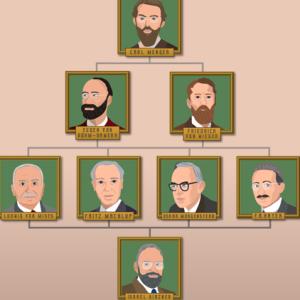
Chapter 10
Austrian Economics Yesterday and Today
The Austrian School of economics has a long and distinguished history. Members of this school have been awarded the Nobel Prize in Economic Science, recognized as Distinguished Fellows of the American Economic Association, elected to the British Academy, served as President of the major scientific associations in economics, edited the major academic journals, and taught at some of the most prestigious universities in the world. Beyond this rich history, the central elements of the Austrian School have contemporary relevance for economic understanding and for public policy.
About the Author

Christopher J. Coyne
Christopher J. Coyne is a Professor of Economics at George Mason University, the Associate Director of the F.A. Hayek Program for Advanced Study in Philosophy, Politics, and Economics at the Mercatus Center, and F.A. Harper Professor of Economics at the Mercatus Center. He received his Ph.D. from George Mason University. He is the co-editor of The Review of Austrian Economics and The Independent Review, and the author or co-author of Tyranny Comes Home: The Domestic Fate of U.S. Militarism; Doing Bad by Doing Good: Why Humanitarian Action Fails; Media, Development and Institutional Change; and After War: The Political Economy of Exporting Democracy. He is also the co-editor of In All Fairness: Liberty, Equality, and the Quest for Human Dignity; Exploring the Political Economy and Social Philosophy of James M. Buchanan; Interdisciplinary Studies of the Market Order: New Applications of Market Process Theory; Future: Economic Peril or Prosperity?; The Oxford Handbook of Austrian Economics; and The Handbook on the Political Economy of War. He has written numerous academic articles, book chapters, and policy studies.

Peter J. Boettke
Peter J. Boettke is a Professor of Economics and Philosophy at George Mason University, the director of the F.A. Hayek Program for Advanced Study in Philosophy, Politics, and Economics, and BB&T Professor for the Study of Capitalism at the Mercatus Center. He received his Ph.D. from George Mason University. Prof. Boettke has developed a robust research program that expands an understanding of how individuals acting through the extended market order can promote freedom and prosperity for society, and how the institutional arrangements shape, reinforce, or inhibit the individual choices that lead to sustained economic development. His most recently published books include F. A. Hayek: Economics, Political Economy and Social Philosophy; and The Four Pillars of Economic Understanding. Prof. Boettke is the editor of numerous academic journals, including the Review of Austrian Economics, and the Journal of Economic Behavior & Organization, and of the book series, Cambridge Studies in Economics, Choice, and Society. He has served as President of the Southern Economic Association, the Mont Pelerin Society, the Association of Private Enterprise Education, and the Society for the Development of Austrian Economics.
Additional Resources
Listed below are links to other websites and resources where you can learn more about the Austrian School of Economics.
Listed below are links to other websites and resources where you can learn more about the Austrian School of Economics.
The Essential Austrian Economics
Peter Boettke emphasizes the preferences and actions of individuals, and explores the key tenets of Austrian economics and its foremost thinkers.
Austrian Economics: A Primer by Eamonn Butler
Jointly published by the Institute for Liberal Studies and the Adam Smith Institute, this is a 121-page ebook quickly breaking down the key areas of focus in the Austrian School (i.e. price theory, knowledge problem, etc.) including criticism and current relevance of the paradigm. Eamonn Butler is now director of the ASI.
Competition and Entrepreneurship by Israel Kirzner
Explains Austrian theory of entrepreneurship and market process. The big takeaway is that the dynamic processes of competition and entrepreneurship are deeply intertwined and, at a certain point, the same. Discusses contemporary industrial organization theory and theory of the firm, re-interpreting these from Kirzner’s perspective. Published in 1973, this is a book by a distinguished disciple of Hayek and Mises and senior figure in Austrian economics today.
What Austrian Economics IS and What it is NOT with Steve Horwitz video by FEE
FI Senior Fellow Steve Horwitz breaks down common misconceptions about the Austrian School, tenets of which are often conflated with political leanings or certain policy platforms. He focuses on the analytical tools that Austrian economics provides and their usefulness in a variety of empirical contexts, while clarifying subtle distinctions between important concepts.
Austrian School of Political Economy I: Value, Prices, & Economic Calculation video from the Mercatus Center at George Mason University
In this discussion, Lemke and Coyne cover a brief history of Austrian economics and the role that value and prices play in economic calculation.
Austrian School of Political Economy II: Knowledge & Institutions video from the Mercatus Center at George Mason University
In this discussion, Lemke and Coyne cover the importance of knowledge and institutions in Austrian methodology.
Austrian School of Political Economy III: The Continuing Relevance of Austrian Economics video from the Mercatus Center at George Mason University
In this video, Hayek Program Senior Fellow Jayme Lemke interviews Associate Director Christopher Coyne on a core approach: the Austrian School of Political Economy. In this discussion, Lemke and Coyne discuss the continuing relevance of Austrian economics.
The Methodology of the Austrian School of Economics video by EconClips (a blog)
A clear and accessible explanation of where the Austrians came from, their contributions to current orthodoxy, and how the School works as a methodological paradigm. Does a good job of explaining the philosophical underpinnings of Austrian axioms, introducing the viewer to the heterodox foundations of the theories that follow.
The Austrian School of Economics by Mary Hall (Investopedia article)
Quick encyclopedia-style article with bite-sized explanations of core concepts in the paradigm.
Austrian School of Economics by Peter Boettke (The Library of Economics and Liberty)
Encyclopedic account of the Austrian School’s intellectual history, beginning with the Marginal Revolution in the 1870s. This is then joined with a breakdown of 10 key propositions unique to Austrian economics.
Keynesian vs. Austrian Economics by Baijnath Ramraika from Seeking Alpha.com
A short overview of the central differences between the Keynesian and Austrian schools, specifically highlighting the role of governments as a market intermediary.
Austrian Economics Explained from econ.economicshelp.org
An organized list of key points and beliefs that Austrian Economists endorse, as well as criticism of the school, simplified in an easy-to-digest format.
Austrian Economics Reading List from Medium.com
A reading list for both beginners and moderately more advanced students, compiled based on categories of Principles, Methodology and Epistemology, History of thought, Economic history, and Monetary Theory. Covering the fundamental aspects of Austrian thought, from subjectivism and marginal utility to inflation and the business cycle.
Understanding Austrian Economics by FEE
An article by Henry Hazlitt, breaking down the fundamental principles of Austrian Economics and real-world application through anecdotal examples.
A Guide to Austrian Economics by CATO
An overview of how the ideas of the Austrian school of economics have long informed the principles of the broader movement. Detailed policy report covering the topic attached.
Austrian Economics from Exploring Economics.org
A bullet-point breakdown of the core elements and economic concept of Austrian Economics, followed by a detailed explanation of ontology, epistemology, methodology, ideology, political objectives, the business cycle, and ongoing debates within the school.
Austrian Economics: An Introduction from Libertarianism.org
An article describing FI Senior Fellow Steve Horwitz’s book on the subject, focusing on the aspect of choice in particular. Also includes a video (the first part of his seven-part lecture series) on the Marginal Revolution and Birth of the Austrian School.
The Empirics of Austrian Economics by Steve Horwitz from Cato Unbound
An article by FI Senior Fellow Steve Horwitz responding to criticism of the Austrian school based on assumptions of “praxeology” and other mainstream misunderstandings.
Peter Boettke and the Austrian School of Economics video by Liberty Fund Books
In this video, Peter Boettke, University Professor of Economics and Philosophy at George Mason University and the BB&T Professor for the Study of Capitalism at the Mercatus Center, talks about the important role Ludwig von Mises, F.A. Hayek, and Israel Kirzner played in the development and understanding of economic thought.
Peter Boettke discusses the Austrian School of Economics video by Liberty Fund Books
In this video Peter Boettke, University Professor of Economics and Philosophy at George Mason University and the BB&T Professor for the Study of Capitalism at the Mercatus Center, gives a brief overview on the history and importance of the Austrian School of Economics.
Why the Austrian School of Economics? from the Austrian Institute.org
A brief article making the case for why the Austrian school promotes economic and social thinking based on how people really are, as opposed to aspirational if unlikely objectives and outcomes.
The Austrian School from Austrian Centre.com
A brief historical overview of prominent thinkers from the Austrian school, and its relevant application in the world today.
Austrian Economics from The Future of Freedom Foundation
A reading list of books and articles explaining the Austrian School of Economics.
Learn Austrian Economics from Liberty Classroom.org
A resource list on Austrian Economics, including links to books, articles, and PDFs.
The Austrian School from The History of Economic Thought.net
An overview/explanation of the Austrian school’s origins, history, prominent thinkers, and beliefs central to this school of economic thought.
Economics in One Lesson by Henry Hazlitt from FEE
A free PDF of the seminal text by Henry Hazlitt. An introduction to economics based on Bastiat’s own theories.
Austrian Economics from Lara Murphy.com
A brief historical account of the Austrian school, the marginal revolution and the transition from the classical labor theory of value into the modern, subjective value theory of market prices. Also includes a “recommended resources” section on Austrian economics.
Hayek in Context of Austrian School of Economics from 4Liberty.eu
A commentary discussing Hayek and his role in the conext of the Austrian school.
Austrian Economics Explained by Fred Foldvary from Progress.org
This 2-page article examines the history, method, and theory of Austrian Economics. Outlines the main topics of Austrian theory and historical studies as a) entrepreneurship; b) money and banking; c) the time structure of capital goods; d) the business cycle; e) the dynamics of markets and spontaneous orders; f) critiques of governmental intervention and planning; g) knowledge as decentralized and unknowable to central planners.
Carl Menger, Founder of the Austrian School of Economics by Jasmin Guénette from MEI
An op-ed that discusses Carl Menger’s formative text, Principles of Economics, and explains Menger’s influence as both the founder of the Austrian School of Economics and one of the pioneers of modern economics.
How Don Lavoie Changed the Debate about Socialism and Central Planning from Mercatus Center
In this video, Hayek Program Director Peter Boettke and Associate Director Christopher Coyne discuss how economist Don Lavoie’s books 'Rivalry and Central Planning: The Socialist Calculation Debate Reconsidered' and 'National Economic Planning: What Is Left?' changed mainstream thinking about socialism and central planning.
Austrian School from Wikiwand.com
Lengthier encyclopedic style article with detailed recounts of the school’s history, waves, transition between early and 20th century thinking, influence, methodology, and fundamental tenets.
History of Austrian Economists from ECAEF.org
A brief historical sketch of the Austrian School’s intellectual foundations, outlining the core concept that the value of goods arises from their relationship to our needs.
The Austrian economists: why we would bring them back from the sidelines from Economics Students.com
This article discusses some of the merits and shortcomings of bringing the Austrian school of economic thought back into the mainstream, and features a useful diagram of Austrian capital theory.
Austrian School of Economics from Nikolaus Kimla.com
A summary of the school’s history, philosophy, methodological and economic framework, fundamental principles, key figures, the pipeliner philosophy, other intellectual foundations, and how these theories fit into shifting markets brought on by ever-evolving technological advances.
Carl Menger, Founder of Austrian Economics from Adam Smith.org
A short overview of Menger’s influence as the founder of the Austrian School of Economics, and how understanding value relates to real world transactions, as people give up what they value less in order to gain what they value more.
Seminar in Advanced Macroeconomics from Econ488.org
A thorough assessment of Austrian economics, including the major cornerstones of methodological individualism, methodological subjectivism, and an emphasis on processes rather than on end states. This article also includes overview of the business cycle, PPF, the Loanable Funds Model, stages of production, stage-specific labour markets, and criticism of the school’s main theories.
Here's how Austrian economics thinks about immigration by Matt McCaffrey (Mises Institute) from Business Insider
A commentary explaining how immigration applies to Austrian economic theory, specifically Mises’ essays in Nation, State, and Economy that tackle this subject. Essentially, what would Mises and the Austrian school say about immigration and its effect on the economy.
What is Austrian economics? from Economic Students.com
An overview of Austrian economics, from its beginnings and views on the business cycle to the emergence of mal-investment. This encyclopedia-style article also addresses the school’s focus upon individuals and how this truly differentiates AE from mainstream economics, as well as its relationship to pluralism.
Austrian Economics from the Library of Economics and Liberty (econlib.org)
A description of the Austrian school’s origins, history, cornerstones, and policy implications based on this school of economic thought.
Essential Scholars is brought to you by
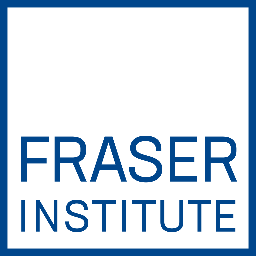
Fraser Institute
Institute for Economic Affairs
Institute of Public Affairs
Foundation for Economic Education
Acknowledgements
Made possible by generous grants from the Lotte and John Hecht Memorial Foundation, the John Templeton Foundation, and the Peter and Joanne Brown Foundation.






